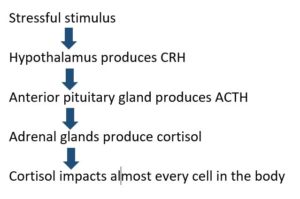Stress has a significant impact on how our body functions. Short term stress can actually be beneficial, for example, exercise is interpreted by the body as acute stress, we produce cortisol and epinephrine (adrenalin) and increase blood sugar, heart rate, and blood pressure. Then when the acute stress is over, the body regenerates cells and repairs muscle and restores glycogen; making the body stronger and better able to deal with the next acute stress.
But what happens if we have increased cortisol all the time?
In my previous post I explained all of the details about what cortisol does in the body but here is a quick list of some key things that happen when we have excessive amounts of cortisol. The effects are dependent on the dose, so the higher the stress level, the more cortisol produced and the stronger the effects will be. Cortisol is a hormone that we definitely want to keep under control.
- Increases blood sugar – can contribute to insulin-resistance and type 2 diabetes
- Increases water retention and blood pressure – contributes to hypertension and tissue swelling, like puffy eyes
- Increases belly fat – nobody likes belly fat
- Breaks down muscle – counterproductive if you are trying to build muscle
- Breaks down bone to release minerals – contributes to osteoporosis
- Inhibits collagen production – we need collagen for healthy connective tissues such as skin, bones, tendons, and joints. Excess cortisol contributes to aging skin, wrinkles, and weak connective tissues
- Inhibits the immune system – increased infections – people get sick more often when they have high stress
- Inhibits mood/thinking molecules – significantly contributes to depression, anxiety, and irritability, it also reduces cognitive functions and ability to concentrate, learning, and memory
- Exacerbates symptoms associated with menopause – primarily hot flashes, mood fluctuations, low sex drive, insomnia, and weight gain
- Causes sugar/ carb cravings and overall increased appetite – contributes to weight gain. Fun fact – Did you know that if you give people an oral dose of cortisol they have an increased startle response in the brain when shown pictures of delicious food, making those people want to eat when they were previously not hungry.
- Inhibits reproductive functions – major contributor to reduced fertility and lowers sex drive
What increases cortisol production?
Cortisol is released anytime there is a perceived stress. Mental/emotional stresses are highly significant to our brain and stimulate a lot of cortisol release. Once the brain has determined something is a threat or a stress, it produces a hormone called Corticotropin-releasing hormone (CRH), that stimulates the pituitary gland to produce Adrenocorticotropic hormone (ACTH), and this is what signals the adrenal gland to make cortisol……so in other words, we need to stop the cycle at the brain level, where the signalling begins.

The number 1 stimulus for producing cortisol is interpreting a situation as threatening. In fact, the brain sees mental stress as way more stressful than physical stress! Some research suggests that if we can think of certain situations as a challenge rather than a threat then it can change the stress response. Using a very simplified example, think of a roller-coaster ride. Some people love roller-coasters and some people are terrified of them. It is the exact same stimulus but people’s reactions can be very different. This is of course a difficult thing to change but it is worth having at the back of your mind when a conflict or emotionally charged situation occurs; try to see if you can think of it as a challenge, or a learning experience. Sometimes it is better to avoid situations, like traffic downtown at rush hour, ha, and sometimes it is better to problem-solve. This is a massive topic I am not going to go into detail about but I just want to put the idea out there that we have some control over how we perceive things, and the situations we put ourselves in, and that has a very significant impact on our physiology. Studies have also shown that our brain interprets situations as more threatening or stressful if we feel we have no control. And lastly, our brain will anticipate stress and produce stress hormones if we think something stressful might happen, even if it hasn’t happened or may never happen.
Caffeine – Any kind of stimulant is going to impact stress hormones because stimulants put the brain on alert. The specific action of how caffeine interacts with cortisol production is not fully understood but there seems to be some differences in males and females. Males tend to have more nervous system stimulation than females.
Physical stress – Extreme physical activity from very long distance exercise or very physically demanding jobs cause a significant amount of cortisol secretion. Illness, physical injury, chronic pain, and extreme temperatures also increase cortisol secretion.
What decreases cortisol production?
Eating carbohydrates – We have to be a little careful with this one because it can lead to weight gain so try to make it healthy carbs like rice or potatoes and not cake or deep fried ice-cream lol. Eating carbs decreases cortisol and increases serotonin that makes us feel good, this is the whole reason why carbs tend to be comfort foods for most people. Cortisol increases our appetite for high energy foods because having energy is beneficial for dealing with stress, so when we eat them it will decrease cortisol. Carbs also increase blood sugar and increased blood sugar decreases cortisol. For athletes, especially endurance athletes that will use up a lot of blood sugar, the drop in blood sugar will increase cortisol that can break down muscle tissue, therefore, endurance athletes should consume sugar intermittently during the exercise. Studies show that endurance athletes that supplement with 7% sugar solutions have significantly less post-exercise cortisol, and therefore, significantly less muscle loss. Other studies show that tryptophan (amino acid used to make serotonin and is found mostly in poultry) helps to reduce exercise-induced cortisol secretion.
GABA – this one is very significant! GABA stands for gamma-aminobutyric acid, and it is a very important inhibitory neurotransmitter that makes us feel calm and relaxed. If we don’t have enough GABA we have anxiety and extremely low amounts have been observed in people that have panic attacks. Benzodiazepine drugs such as Valium or Xanax or Ativan are sometimes used to treat anxiety/panic because they mimic GABA. GABA significantly reduces the brain’s production of CRH, and therefore cortisol.
- We can actually ingest some natural sources of GABA, such as fermented milk products like yogurt and kefir, sprouts of brown rice, barley and beans. I am adding bean sprouts to my next stir fry ha. The amounts are small but still significant. I don’t think bean sprouts and yogurt would get rid of a panic attack but it does contribute to an overall reduction in cortisol.
- Trace elements that are required for GABA production in the brain – vitamin B6 and B12, lithium (found in grains, fish, and lots of different veggies), folic acid, and glutamine. B6 is especially important for GABA production, B6 is found in fish, poultry, eggs, whole grains, brown rice, wheat germ, peanuts and vegetables…..so eat whole foods.
- Studies show that practicing yoga stimulates a significant increase in GABA. Other studies show that deep breathing exercises and meditation increase GABA.
Magnesium – Is an important mineral that acts as a cofactor for many enzymes to function in our body, it also counters the excitatory effects of calcium in the nervous system and muscles. A lack of magnesium (like if you drink a lot of caffeine or alcohol that has diuretic effects), can cause excess stimulation of neurons and muscles. One indicator that you need some extra magnesium is if you have muscle cramps. Magnesium also has an inhibitory effect on NMDA receptors, which leads to a reduction of the ACTH production by the pituitary gland, and therefore reduces cortisol secretion. Dark chocolate contains magnesium, just sayin’.
Omega 3 fatty acids – Fish oil supplement research is not conclusive but some studies show that supplements containing at least 60mg/day of DHA (a subtype of omega 3 oil), reduces cortisol as well as the subjective feeling of stress.
Green tea – A component of green tea (called epigallocatechin-3-gallate) inhibits the activity of the enzyme that converts cortisone to cortisol. Cortisone is the last step in the production of cortisol.
Ginseng – is an adaptogen so it helps the body deal with stress. Studies show that it reduced cortisol by 16% in 4 weeks….but ginseng can act like a stimulant in some people so you would need to try it to see how your body reacts, it may not work the same way in everyone.
Sleep/ take breaks – get enough sleep, or have a 20-minute power nap during the day. Ongoing fatigue and sleep disturbances keeps cortisol levels high. A short nap can help you feel more rested without affecting your normal circadian rhythm. Even if you don’t sleep but take 5 minutes for yourself during the day to just close your eyes, take some breaths and take time away from thinking/reading/talking etc. can be extremely beneficial for brain function and cortisol levels.
Laughing – Laughing actually reduces cortisol! Life should be fun, make sure you have time to hang out with fun people and laugh, it really is the best medicine.

